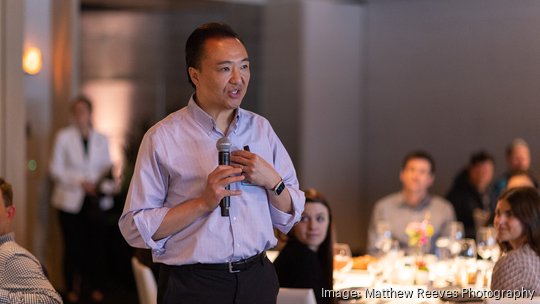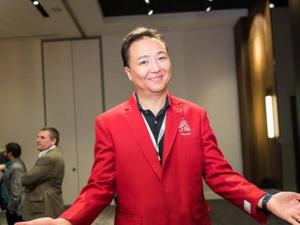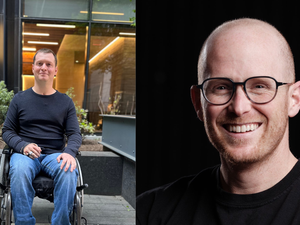
The big "1-0-0" snuck up on David Chang.
The serial entrepreneur made his first angel investment back in 2007. At the time, he wasn’t looking to get into investing. He had a meeting with the founder of a company called xPeerient because he was searching for his next startup job. The role wasn’t right, but he saw promise in the company. Chang and his wife, Shereen Shermak, ended up writing them a check — “probably like a $7,500 check or something” — marking his first angel investment.
The success of his second angel investment may have gone to some investors’ heads. Chang invested in Boston-based Crashlytics, which Twitter acquired in 2013. He saw a 50X return on that investment, which fully liquidated last year, when Elon Musk bought Twitter.
Chang humbly characterized the success of some of those early investments as “dumb luck.” But 98 additional investments later, Chang seems to have found a strategy and community in angel investing that stands out in Boston’s tech scene: In April, Chang made his 100th angel investment. That money went to RevUp Capital, a revenue-based investing firm for early-stage companies. Chang recently sat down with BostInno to talk about his angel investment journey and evolving strategy, advice for getting into angel investing and the Boston tech hiring scene.
Making angel investing a 'team sport'
When Chang first started out angel investing, he stuck with what he knew. Chang was a serial entrepreneur of six venture-backed startups and executive at companies like TripAdvisor and PayPal. In more recent years, he led Babson College’s summer venture program and was an entrepreneur-in-residence at Harvard Business School.
He started out by looking for founders he respected and industries he was experienced in, such as the mobile space.
“I think in the very beginning, it was more about wanting to be in spaces where I knew a little bit about the space, so value-add,” Chang said.
As he began investing more in startups, Chang adopted a more rigid approach to reviewing companies.
“I had a whole grid of, 'I have to understand these nine things about the company within the first 30 minutes,' ” Chang said. “And by the end of that, look at the sheet and say, do I know enough about the business to do the next round?”
Chang said this resulted in him spending “a ton of time kicking tires,” which for someone who still had a day job beyond investing, the process was becoming too much. He started thinking about ways he and fellow angel investors could share the load.
Chang and a group of fellow founders and operators co-founded TBD Angels in 2020 to collaborate on investing opportunities. The group works asynchronously, with angels meeting potential founders and reviewing company materials on their own time. Angels will always have differing levels of time, capital and knowledge in an area, Chang said. TBD Angels allows them to share the work and their expertise.
By his count, Chang has probably made about 20 direct investments, 20 through someone else where he was “kind of hands off” and 60 through TBD Angels and other syndicates.
He advises people who are thinking about starting angel investing to approach it as a “team sport” by finding local groups or syndicates online.
“I do think you want to find another group of people to learn from. Doing it solo is just really hard,” Chang said.
Hiring in the Boston startup scene
It’s been a momentous few months for Chang. In addition to making his 100th angel investment, in May, Chang also celebrated one year at the Hunt Club. He joined the Chicago-based recruiting company last year and has been building out the Boston team, including the new addition of former Silicon Valley Bank leader Jesse Bardo as general manager of New England.
Coincidentally, it was an investment by TBD Angels that first introduced Chang to Hunt Club. The process moved so fast, Chang actually missed out on the email about the investment opportunity. Later, someone he knew at the company started sharing open positions at Hunt Club. Eventually, the role of general manager of the expert network came up, and he jumped at it.
“Here’s a role about growing a network, software, community, all the things I love to do,” Chang said.
From his role in the recruiting world, Chang has noticed a few changes in Boston’s startup scene over the last year. When tech layoffs started happening last summer, investors got more cautious about deploying capital and focusing more on existing portfolio companies. Those winners continue to grow and hire, Chang said.
There has also been more talent on the market, which makes it harder for companies to find the ideal person for a role. Where there might usually be 100 candidates for a CMO role, now there’s more like 200, Chang said. Hunt Club uses software to screen through and identify the best candidates for each specific role.
“It’s that much more work to find good people, but our software is designed to be able to do that,” Chang said.
Sign up for The Beat, BostInno’s free daily innovation newsletter. See past examples here.








